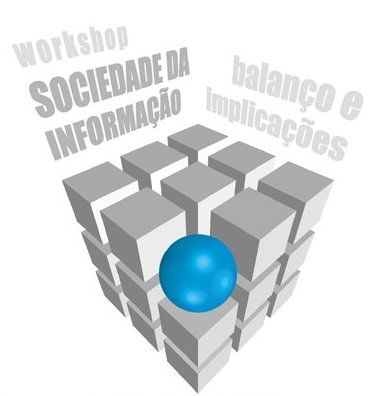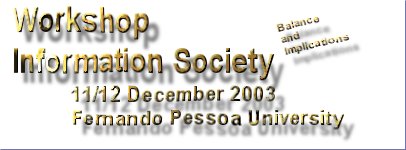

Information Society Workshop
Balance and Implications
11th/12th December 2003,
Universidade Fernando
Pessoa, Porto, Portugal
Organised by:
Luis Borges Gouveia,
[lmbg@ufp.pt]
[homepage]
[blog]
Sofia Gaio, [sgaio@ufp.pt]
[homepage]
Workshop homepage (committe, prices, program)
WORKSHOP SCOPE
The Information Society, within the framework of a set of worries that cross our society, whether through public discussion and action policy that involves its development, or through the economic and social consequences they entail, has made this a recurrent subject from 1994 until today.
In 1997 the Green Book of the Information Society was developed in Portugal and in 2000 the conditions for a european policy that stimulates the Information Society were created in Lisbon, which culminated in eEurope2002 and more recently eEurope2005. It is therefore important to discuss the impact and implications that these events have caused since 1994.
The growing omnipresence of the Information and Communication Technologies are the direct cause of deep changes in our way of living, learning and entertaining, leading to new ways of being and acting by social and commercial actors.
In view of the paradigms promoted by the Information Society, it is urgent to undertake discussion and reflection, in order to contribute to a better understanding of the milieu and a consequently better adaptation of the acting parts. It is from this awareness that the impulse emerges to carry out the Information Society Workshop – Balance and Implications.
OBJECTIVES
Given the amplitude and heterogeneity of sectors that reinvent themselves in the light of a technological society, as well as of the sometimes enormous hiatus between potentialities and realities assossiated with the new Information and Communication Technologies, these are the main goals of this workshop:
To reflect on the Information Society in
Portugal and in a wider context;
To diagnose and characterise the
state-of-the-art in different economic and social sectors;
To discuss possible pathways for the
Information Society;
To reflect on paradigms characteristic of the
Information Society.
In this sense, the workshop will promote the reflection on the new configurations around the following subjects:
• Socialise and interact
• Work and manage
• Teach and learn
• Inform and sell
• Applications and services
• Social impact and tendencies
CALL FOR PAPERS
It is intended that contributions to the Information Society Workshop – Balance and Implications – constitute a set of texts which take a position on the problematics.
The participants have therefore the challenge to cooperate by handing in an article that establishes the connection between their field of work and the Information Society, contributing this way to the reflection on the problematics and associated issues.
The texts will be published in two volumes, which will comprise the written contributions in Portuguese and in English. The publication of the selected texts will occur in the same way as for the Workshop on Digital Cities and Regions (Workshop sobre Cidades e Regiões Digitais) which resulted in a book with the same name.
► The call for papers is open to anyone interested in participating with a written paper, as long as they are active professionals or teachers/lecturers;
► The article must be original and it is the authors’ full responsibility;
► It should be sent in MicrosoftWord format via e-mail to Prof. Luis Borges Gouveia (lmbg@ufp.pt) until 10th December 2003;
► The acceptance and qualification of the paper will be reviewed by the Commission, according to the objectives of the workshop. The first authors of the presented submissions will be notified whether the respective article was accepted via e-mail within 5 days after its receipt;
Publication norms
► It can be written in Portuguese or English (according to the volume in which the authors wish to see it published);
► It should not exceed 14 pages in A4 format;
► The heading should consist of the title, the authors’ names, job title, institution they work for, and electronic mails;
► It should contain an abstract of about 80 words;
► Formatting:
* Title: Centred, Times New Roman 16pt, black;
* Authors’ names: Centred, Times New Roman 11pt;
* Job title, institution they work for and electronic mails: Centred, italic, Times New Roman 11pt;
* Abstract: Justified, Times New Roman 11pt;
* Body of text: Justified, Times New Roman 12pt. The line spacing should be simple and the space between paragraphs should be 18pt (1,5 lines);
* Titles and subtitles: They should be numbered with roman numerals. Titles should be written in Times New Roman 14pt, black, and subtitles in Times New Roman 12pt, black;
► Bibliography at the end of the paper (Times New Roman 11pt) should respect the structure of the following examples:
* For a book: Negroponte, N. (1995). Being Digital. New York, Vintage Books.
* For an article: Burke, R. (1996). Virtual Shopping: Breakthrough in Marketing Research. Harvard Business Review, March-April, pp. 120-131.
* For an Internet reference: Hoffman, D. (1996). A New Marketing Paradigm for Electronic Commerce. [online]. Available at http://ecommerce.vanderbilt.edu/novak/new.marketing.paradigm.html. [Looked up on 10.01.2001].
► Illustrations:
* Illustrations (pictures, graphics and charts) should be saved in different documents, properly identified. In the text document, it shall be made reference to the place only;
* Illustration numbers and titles should be included in the body of text, in Word format, and not in the illustrations themselves;
* Pictures should be sent in TIFF format with 300dpi resolution;
* Graphics should be sent in Excel, in the original document in which they were created;
* Charts made of tables should have a simple line separating rows and columns, as they will be formatted according to UFP’s graphic design;
► Special formatting sould not be used, such as:
* styles (headings, hyperlinks, etc.);
* text in columns
* page headers;
* different font types;
* underlined words;
* automatic hyphenation;
* automatic numbering of chapters, sections or paragraphs.
Created on 27 October, 2003
Updated: 13/11/03